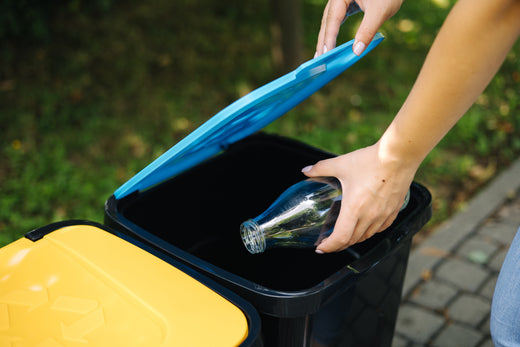Glass recycling is a great example of how the environment can be preserved. The environmental and financial benefits of this are both substantial. It also saves energy, reduces pollution by reducing the natural resources needed to make new glass products, and reduces greenhouse gas emissions because less coal is burned when making new glass products from recycled materials than raw materials. In short, Glass has three main environmental benefits: reusable, recyclable, and made from a renewable resource (sand). But how to recycle glass?
There are many ways to recycle glass bottles and jars, but every recycling process has benefits and drawbacks. This guide will cover what you must know about recycling glass bottles to decide which process is best for your situation.
How to recycle glass jars?
Glass jars are one of the most commonly recycled items. They can be recycled many times again, but that's not the only option.
The first step is to take off the labels from the jar. You could use rubbing alcohol or a product that takes off nail paint to do this. Once you have removed all the labels, wash them thoroughly before proceeding to step two.
Step 2: Pour a little amount of rubbing alcohol into the jar. The rubbing alcohol you use is not essential, but make sure you don’t use an eye-safe or chemical-based type.
Step 3: Position a plate with a paper towel or cotton ball atop the container and position it on a counter or other flat surface.
Step 4: Set the jar aside for approximately 20 minutes, wrapped with a paper towel or cotton ball.
Step 5:
-
Remove the paper towel or cotton ball.
-
Pour away any rubbing alcohol left on top of the jar.
-
Dry out with a clean cloth.
Now you can use your new label-free mason jar for dry goods such as flour, sugar, and rice.
What are the steps to recycle bottles at home?
Glass bottle recycling is a simple operation that may be completed at home.
Step 1: You should immediately begin scrubbing your bottles with soap and water to eliminate any remaining food or grime.
Step 2: Rinse the bottle thoroughly with clean water.
Step 3: Put some hot water and dish soap droplets in the bottle. Wait 15 minutes before opening the bottle.
Step 4: Fill a bucket with cold water, ice, and dish soap or detergent. After cleaning it out with the soapy bottle in the bucket, rinse it well with cold water to remove any remaining foam.
Step 5: You can finally recycle your glass bottle after all this work!
Where to recycle glass near me?
Glass can be recycled indefinitely without affecting its quality or purity. Still, it cannot be recycled as there will come the point where it will no longer be economically viable. Some people think this type of recycling should not be done because it relies on a finite resource, sand, and the quantity of sand reserves is limited. In the United States, about 2.5 million tons of glass are produced annually, but only around 30% of it gets recycled.
Who buys recycled glass?
People who reside in urban areas and have access to recycling centers recycle glass frequently. But this trend is growing in communities that have a recycling program. There are many different types of people who buy recycled glass. Some are interested in sustainability, whereas others want to make an environmentally friendly statement using this product. Others might just be looking for a cheaper alternative to other materials because they have sizeable recycled glass from another project. Finally, some are looking to recycle glass bottles for money. The most common type of person who buys recycled glass is looking for a cheaper alternative to other materials like steel or concrete.
Common Concerns of Buying Recycled Glass
The environmental impact of the glass industry is a significant concern for many people. However, this concern is often overshadowed by the perceived risk of using a recycled wine glass.
To address these concerns, we must look closely at all the benefits and risks of using recycled wine glasses.
1) Environmental Impact:
The environmental impacts of producing wine glasses are well documented and significant. Manufacturing procedures consume massive quantities of energy and water, resulting in high levels of pollution. The manufacture of glass results in the generation of hazardous waste that, if not disposed of appropriately, may pollute land and water systems for decades.
2) Health Concerns:
In many cases, recycled wine glasses contain lead levels that exceed federal safety standards. Reusing wine glasses has been a growing trend in recent years. This is mainly because it saves money and reduces the number of dishes needing cleaning. However, many people don't know the risks of reusing wine glasses. Furthermore, the Food and Drug Administration discovered that many reused wine glasses contain lead levels that often exceed federal safety standards.
How many times can you recycle glass?
Glass is a fantastic material that is used in a lot of applications. It can be recycled repeatedly, which is excellent for the environment. The recycling process for glass is pretty straightforward. As long as it is not contaminated with food or other things, glass may be recycled forever.
Glass may be recycled in a ways, including number of for containers, in fiberglass, and in window panes. Container glass can be recycled indefinitely because it has no contaminants like food or drink residue. Since fiberglass is composed entirely of silica, there is no risk of contamination from any other substances during recycling. Unfortunately, window glasses have a higher melting point, so they cannot be reused as often as the two different types of glasses.
Recycling glass is a simple and effective way to make a difference. It helps reduce the production of greenhouse gases, conserve natural resources, and reduce the need for landfills. However, we should not be too fast or quick to discard our old bottles. Instead, we should see them as an opportunity to make a difference by recycling the glass into something new and useful.




